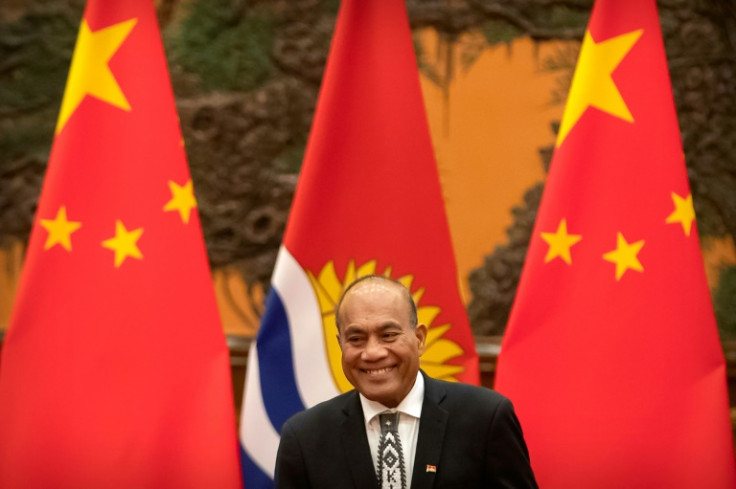Kiribati Heads To Polls In Test For Pro-China Government

Polls opened in the Pacific nation of Kiribati on Wednesday, after a campaign dominated by the rising cost of living, rising sea levels and questions about the benefit of deeper ties with China.
Across more than a dozen islands and atolls hugging the international dateline, voters will select a batch of lawmakers to represent their 130,000-strong nation.
Incumbent 63-year-old President Taneti Maamau is seeking to extend his almost-decade-long tenure.
Since coming to power, Maamau has drawn Kiribati ever closer to Beijing, betting ties with the world's second largest economy will help his country meet ambitious 2036 development goals.
Ahead of election day, China's ambassador Zhou Limin offered a warm embrace of Maamau's government, and its "historic achievements in various areas".
"In the past year, I have observed an increase in the number of cars on the roads, a wider range of goods in supermarkets, and new entertainment equipment at playgrounds, which are strong proof of the improvement of Kiribati people's life quality", he wrote.
But many residents see less to cheer about, and complain about the rapidly rising cost of living. Consumer prices rose more than nine percent last year, according to official data.
And despite faster economic growth, there are concerns that closer China ties have fuelled what one former Kiribati president described as creeping authoritarianism.
In recent years, Maamau has suspended two High Court justices -- expelling one who is the partner of a Kiribati opposition leader.
Maamau signed off on a secret security pact with China, which brought uniformed Chinese police officers to the capital Tarawa.
Ostensibly the rotating cadres of Beijing police advisors were sent to help train Kiribati's under-resourced force.
But it was also seen as another volley in the battle for Pacific influence between China and the United States.
Some Western analysts allege that Chinese activities in Kiribati -- from police deployments, to developing a runway on Kanton Island, to extensive marine mapping -- are a pretext for establishing a bigger security footprint.
Graeme Smith of the Australian National University said sending police to Kiribati offers Beijing "another intelligence channel into what is happening in the country... another line of reporting in addition to their diplomats."
There have been persistent rumours that China would look to re-establish a satellite tracking station on the islands.
But details of Kiribati's broader security agreement with China have not been made public, "so it's all a mystery," according to Australian Strategic Policy Institute analyst Blake Johnson.
Despite China's largesse, a significant drop in foreign aid -- along with a massive pay rise for government workers -- means Kiribati's fiscal deficit is expected to jump to 9.7 percent of GDP this year, according to Asian Development Bank forecasts.
External debt is forecast to balloon by almost 400 percent in the coming years, reaching 35 percent of GDP by 2029.
Inflation-hit voters may decide the time has come for a change in approach.
"If Maamau doesn't get back in and the opposition faction does, that could completely change the direction in Kiribati," Jon Fraenkel, a political science professor at Wellington's Victoria University, told AFP.
The general election has up to two rounds of voting, and the process can stretch on for months.
Citizens then separately elect a president from a pool of candidates put forward by lawmakers - "that will be what will really decide the future," Fraenkel added.
Low-lying Kiribati faces a raft of economic and environmental challenges, such as rising sea levels that regularly taint scarce supplies of drinking water.
With outer atolls already under threat from coastal erosion, Tarawa has become one of the world's most densely-populated places.
Encroaching sea waters and the search for higher ground means the capital today has a population density comparable with Tokyo.
Residents are plagued by contagious diseases and other symptoms of overcrowding.
© Copyright AFP 2024. All rights reserved.





















